BSF Head Constable Ministerial (HCM) Mock Test - 2 - BSF Head Constable MCQ
30 Questions MCQ Test - BSF Head Constable Ministerial (HCM) Mock Test - 2
Select the most appropriate ANTONYM of the given word.
Beseech
Select the most appropriate synonym of the underlined word as used in the sentence.
No person is allowed to transgress beyond the line of control.
No person is allowed to transgress beyond the line of control.
| 1 Crore+ students have signed up on EduRev. Have you? Download the App |
Which of the following can be an appropriate title for the passage?
Select the most appropriate antonym of the given word.
Morose
Select the most appropriate option that can substitute the underlined segment in the given sentence. If there is no need to substitute it, select 'No substitution'.
The company decided to sell their stake in their subsidiary, because it was under massive debts.
Three statements are given, followed by three conclusions numbered I, II and III. Assuming the statements to be true, even if they seem to be at variance with commonly known facts, decide which of the conclusions logically follow(s) from the statements.
Statements:
No ties are pants.
All pants are shirts.
All ties are shirts.
Conclusions:
I. Some shirts are ties.
II. Some shirts are pants.
III. Some ties are shirts.
Some letters are given which are numbered 1, 2, 3, 4, 5 and 6. Find the combination of numbers so that the letters are arranged accordingly to form a meaningful English word.

Which of the following numbers will replace the question mark (?) in the given series?
23, 50, 73, 100, ?
Select the number from among the given options that can replace the question mark (?) in the following series.
38, 53, 70, 89, ?
 and y =
and y =  then what is the value x3 - y3 ?
then what is the value x3 - y3 ?
An inlet pipe can fill an empty tank in 4 1/2 hours while an outlet pipe drains a completely filled tank in 7 1/5 hours. The tank is initially empty. and the two pipes are alternately opened for an hour each, till the tank is completely filled, starting with the inlet pipe. In how many hours will the tank be completely filled?
A person can complete a journey in 7 hours 30 minutes. He travels first half of the journey at the rate of 24 kmph and second half at the rate of 36 kmph. What is the total distance he travelled?
If '+' means '÷' , '-' means '+', '×' means '-' and '÷' means '×', what will be the value of the following expression?
[{(49 × 12) - (6 ÷ 2)} + (4 - 3)] ÷ 5
In the questions below, out of the four alternatives choose the word which is the exact OPPOSITE of the given word.
MORTAL
Arrange these words in alphabetical order and find the middle word:
Quality, Quick, Quiz, Quarter, Queen
Answer the question based on the set of numbers given below -
429 738 273 894 156
If the positions of the first two digits in each number are reversed, then the difference between the first digit of the greatest number as well as of the lowest number is equal to -
Arrange the following computers according to the chronological order of their generation.
i) ENIAC
ii) PDP - 8
iii) NCR 395
iv) Apple II
Identify correct or incorrect from the following statements
i) Assembly language is a low-level programming language.
ii) Interpreter is a program that translates each statement in a programming language into machine code and executes it.
iii) The output of an assembler is in binary code.
Which of the following options best describes the accuracy of the given statements?
i) SMTP stands for Simple Mail Transfer Protocol.
ii) GIF stands for Graphics Interchange Format.
iii) The meaning of HDD is Hard Disk Dirve.


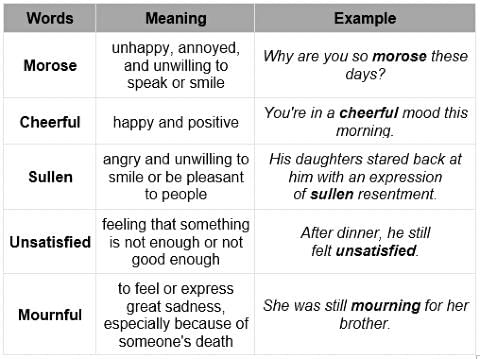
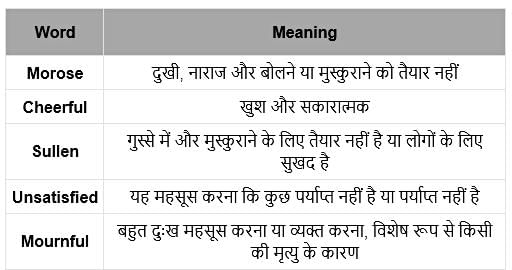
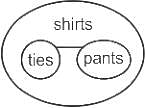


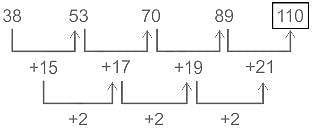
 and y =
and y = 
 ×
×  = 1 -----(1)
= 1 -----(1) -
- 


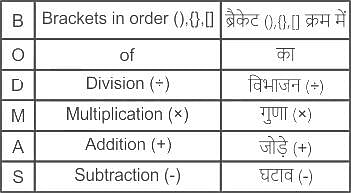

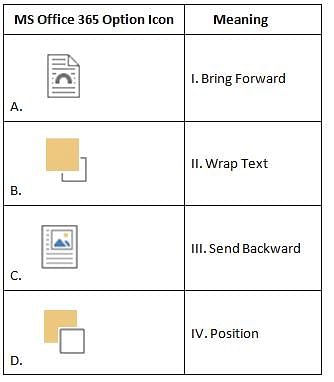
 - The icon shows text wrapping around an object, which corresponds to Wrap Text.
- The icon shows text wrapping around an object, which corresponds to Wrap Text. - The icon with a rectangle and an arrow pointing upwards usually represents Bring Forward.
- The icon with a rectangle and an arrow pointing upwards usually represents Bring Forward. -
-  -
- 














